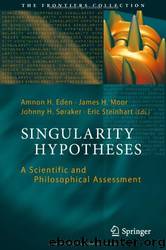Singularity Hypotheses: A Scientific and Philosophical Assessment (The Frontiers Collection) by Amnon H. Eden & James H Moor & Johnny H Soraker & Eric Steinhart

Author:Amnon H. Eden & James H Moor & Johnny H Soraker & Eric Steinhart [Eden, Amnon H. & Moor, James H & Soraker, Johnny H & Steinhart, Eric]
Language: eng
Format: epub
ISBN: 9783642325595
Amazon: 3642325599
Publisher: Springer
Published: 2013-04-03T00:00:00+00:00
most powerful real-world supercomputer. But there’s a worse problem: reflexivity.
Predicting sociological phenomena differs essentially from predicting mindless
physical phenomena. Even in a classical, causally deterministic universe, the
behaviour of mindful, reflexively self-conscious agents is frequently unpredict-
able, even in principle, from within the world owing to so-called prediction par-
adoxes (Welty 1970). When the very act of prediction causally interacts with the
predicted event, then self-defeating or self-falsifying predictions are inevitable.
Self-falsifying predictions are a mirror image of so-called self-fulfilling predic-
tions. So in common with autistic ‘‘idiot savants’’, classical AI gone rogue will be
218
D. Pearce
vulnerable to the low cunning of Machiavellian apes and the high cunning of our
transhuman descendants.
This argument (i.e. our capacity for unitary mind-simulation embedded in
unitary world-simulation) for the cognitive primacy of biological general intelli-
gence isn’t decisive. For a start, computer-aided Machiavellian humans can pro-
gram robots with ‘‘narrow’’ AI—or perhaps ‘‘train up’’ the connections and
weights of a subsymbolic connectionist architecture (Rumelhart et al. 1986)—for
their own manipulative purposes. Humans underestimate the risks of zombie
infestation at our peril. Given our profound ignorance of how conscious mind is
even possible, it’s probably safest to be agnostic over whether autonomous non-
biological robots will ever emulate human world-simulating or mind-reading
capacity in most open-field contexts, despite the scepticism expressed here. Either
way, the task of devising an ecologically valid measure of general intelligence that
can reliably, predictively and economically discriminate between disparate life-
forms is immensely challenging, not least because the intelligence test will express
the value-judgements, and species- and culture-bound conceptual scheme, of the
tester. Some biases are insidious and extraordinarily subtle: for example, the desire
systematically to measure ‘‘intelligence’’ with mind-blind IQ tests is itself a
quintessentially Asperger-ish trait. In consequence, social cognition is disregarded
altogether. What we fancifully style ‘‘IQ tests’’ is designed by people with
abnormally high AQs (Baron-Cohen 2001) as well as self-defined high IQs. Thus,
many human conceptions of (super) intelligence resemble high-functioning autism
spectrum disorder rather than a hyper-empathetic God-like Super-Mind. For
example, an AI that attempted systematically to maximise the cosmic abundance
of paperclips (Yudkowsky 2008) would be recognisably autistic rather than
incomprehensibly alien. Full-Spectrum (Super-) intelligence is certainly harder to
design or quantify scientifically than mathematical puzzle-solving ability or per-
formance in verbal memory-tests: ‘‘IQ’’. But that’s because superhuman intelli-
gence will be not just quantitatively different but also qualitatively alien (Huxley
1954) from human intelligence. To misquote Robert McNamara, cognitive sci-
entists need to stop making what is measurable important, and find ways to make
the important measurable. An idealised Full-Spectrum Superintelligence will
indeed be capable of an impartial ‘‘view from nowhere’’ or God’s-eye-view of the
multiverse (Wallace 2012), a mathematically complete Theory of Everything—as
does modern theoretical physics, in aspiration if not achievement. But in virtue of
its God’s-eye-view, Full-Spectrum Superintelligence must also be hypersocial and
supersentient: able to understand all possible first-person perspectives, the state-
space of all possible minds in other Hubble volumes, other branches of the uni-
versal wavefunction—and in other solar systems and galaxies if such beings exist
within our cosmological horizon. Idealised at least, Full-Spectrum Superintelli-
gence will be able to understand and weigh the significance of all possible modes
of experience irrespective of whether they have hitherto been recruited for
information-signalling purposes. The latter is, I think, by far the biggest intel-
lectual challenge we face as cognitive agents.
Download
This site does not store any files on its server. We only index and link to content provided by other sites. Please contact the content providers to delete copyright contents if any and email us, we'll remove relevant links or contents immediately.
Periodization Training for Sports by Tudor Bompa(8273)
Why We Sleep: Unlocking the Power of Sleep and Dreams by Matthew Walker(6726)
Paper Towns by Green John(5191)
The Immortal Life of Henrietta Lacks by Rebecca Skloot(4589)
The Sports Rules Book by Human Kinetics(4388)
Dynamic Alignment Through Imagery by Eric Franklin(4217)
ACSM's Complete Guide to Fitness & Health by ACSM(4060)
Kaplan MCAT Organic Chemistry Review: Created for MCAT 2015 (Kaplan Test Prep) by Kaplan(4014)
Livewired by David Eagleman(3775)
Introduction to Kinesiology by Shirl J. Hoffman(3774)
The Death of the Heart by Elizabeth Bowen(3622)
The River of Consciousness by Oliver Sacks(3604)
Alchemy and Alchemists by C. J. S. Thompson(3522)
Bad Pharma by Ben Goldacre(3428)
Descartes' Error by Antonio Damasio(3279)
The Emperor of All Maladies: A Biography of Cancer by Siddhartha Mukherjee(3163)
The Gene: An Intimate History by Siddhartha Mukherjee(3098)
The Fate of Rome: Climate, Disease, and the End of an Empire (The Princeton History of the Ancient World) by Kyle Harper(3067)
Kaplan MCAT Behavioral Sciences Review: Created for MCAT 2015 (Kaplan Test Prep) by Kaplan(2987)
